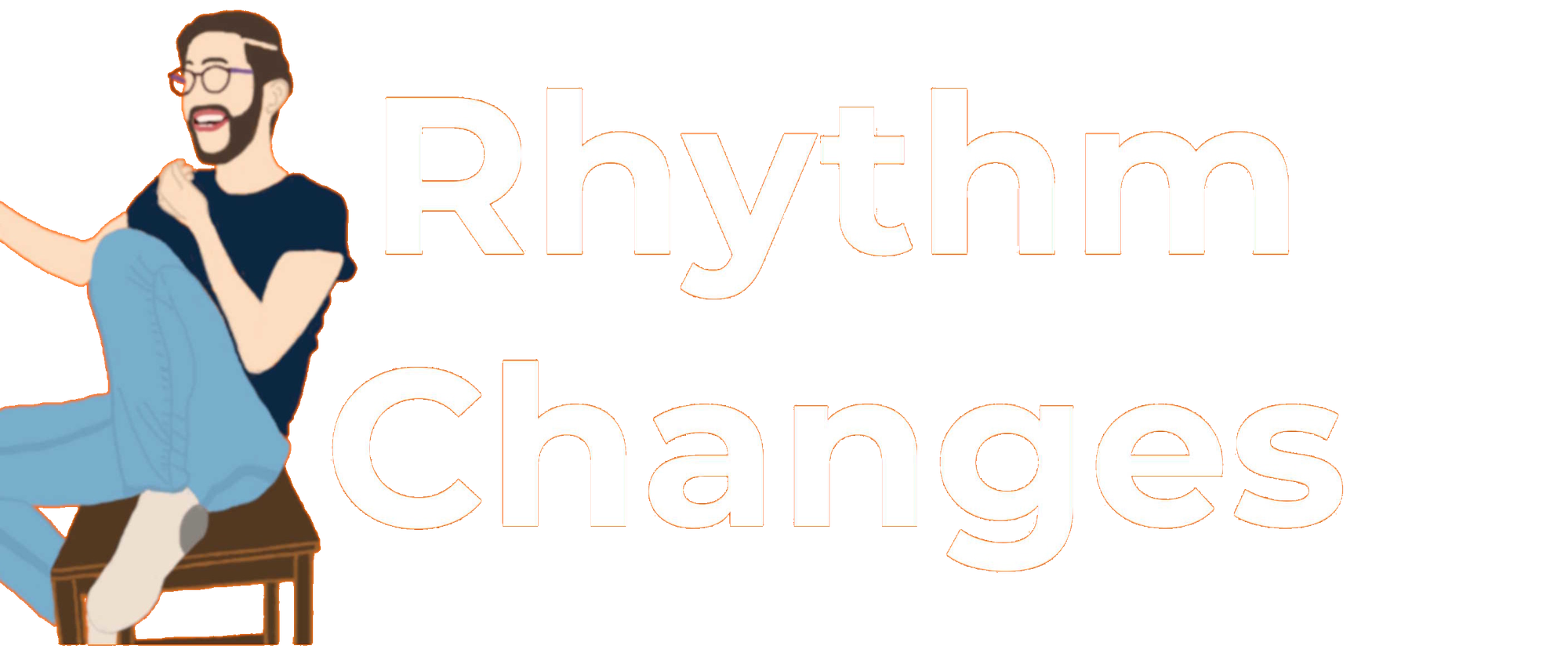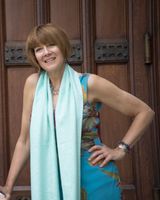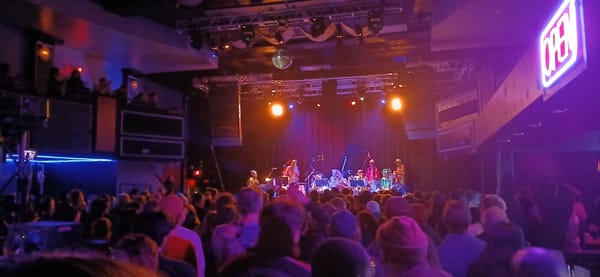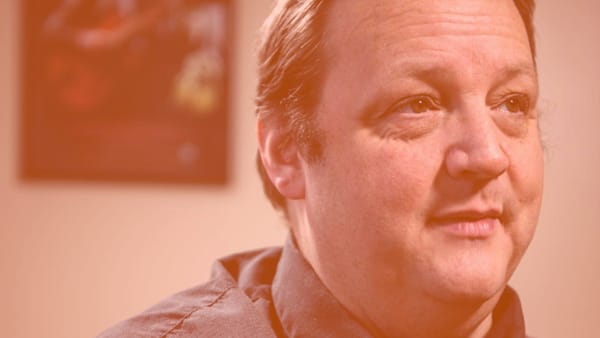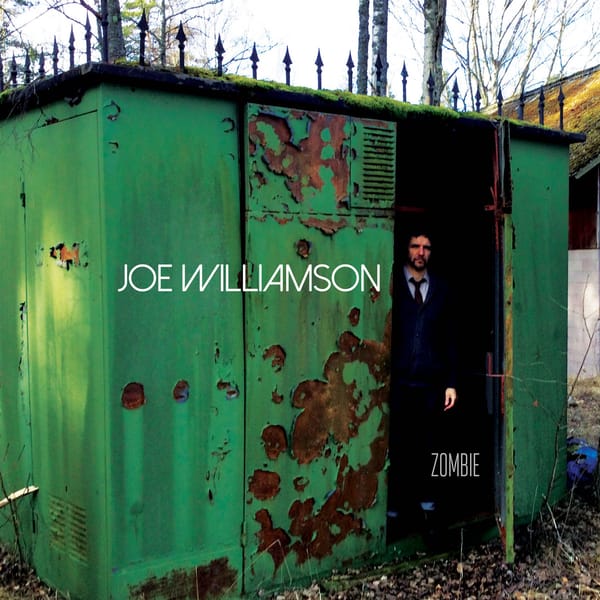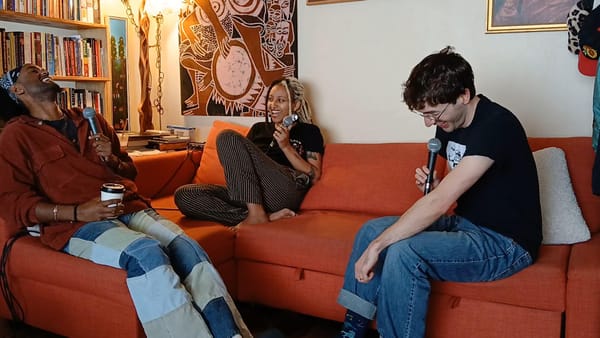Karl DeJong: drums, records, friends, flow, bandleading
There’s something egoless and subtle about the way Karl seems to approach music. I can’t help but be drawn to that energy
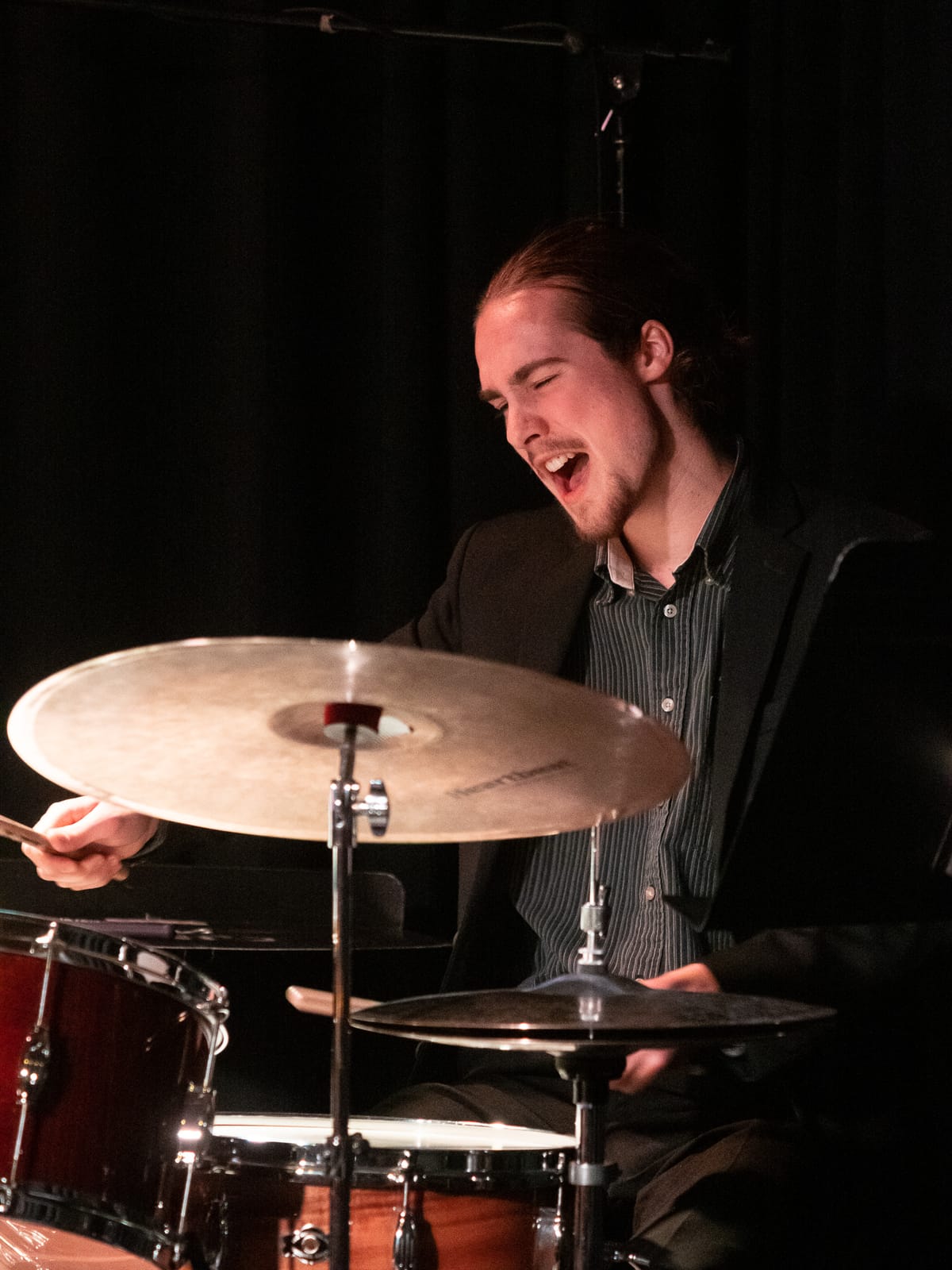
Karl DeJong is a Vancouver based drummer and composer. Each time I have had the pleasure of being in the audience when Karl has played, I have been impressed on many levels. There’s something egoless and subtle about the way Karl seems to approach music, whether he is leading a band or is part of an ensemble led by someone else. I have witnessed what I believe is a keen sense of humour and a high level of freedom in the exploration of sound, rather than just laying down the groove. Freedom when you are a jazz musician might seem like a no-brainer, but I don’t think it always occurs. Whether Karl is playing with sticks or brushes, or possibly just using his hands on the drum kit, he has a notable spark in his playing that comes through in each piece. I can’t help but be drawn to that energy.
Last November, when Karl led a quartet performing a Jazz Vespers at St. Andrew's-Wesley United Church, the band played several of his own compositions, beautifully arranged to feature each of the players: Julian Borkowski on trumpet, Noah Franche-Nolan on piano, and Wynston Minckler on bass. A wonderful quartet! Throughout that performance, Karl became the backbone of those pieces, filling in spaces and helping create an atmosphere rather than jumping in to feature his own playing. Somehow that stayed with me: being a leader and composer, and yet being in the background, confidently serving the music and trusting the sum to be greater than the parts.
I am grateful that Karl took the time in his busy schedule to do this interview, so I could get to know more about his life in music and creativity. I look forward to hearing him perform during this year’s Vancouver International Jazz Festival with the Ru & Harmeet Quintet, and I certainly look forward to hearing more of Karl’s original music performed live. Hopefully we'll hear some of the music on an upcoming recording, too.
KARIN PLATO: Karl, do you play other instruments, or do you play drums/percussion exclusively?
KARL DeJONG: While I certainly consider myself a drummer first and foremost, I do play a decent amount of piano, and some guitar as well. I’d definitely say that I’m a composer before I’m a pianist or guitarist, but I use those instruments extensively when I’m writing, particularly the piano. I also find that as a drummer, it’s just necessary for my soul to have some kind of harmonic and melodic output.
KP: Where did you first study/learn to play the drums?
KD: I began exhibiting the troubling characteristics of a drummer at a very young age, which eventually prompted my lovely and generous parents to try and channel that energy into one of those little baby drum kits. I probably had some sort of formative experiences in those early years, but I was about 10 before I began taking lessons and actually caring about the drums, and it still took a few years after that for me to warm up to the idea of practicing.
KP: Who are some of your favourite musicians current or past eras?
KD: It’s rather difficult not to go into egregious detail with this question, but I’ll just list a few folks who have inspired or touched me in a notable way: Wayne Shorter, Herbie Hancock, Chick Corea, Bill Stewart, Antonio Sanchez, Tigran Hamasyan, Chief Xian aTunde Adjuah, Avishai Cohen the bassist, Joel Ross, Immanuel Wilkins, Jeremy Dutton, Jimmy MacBride, Jacob Collier, Simon Green(aka: Bonobo, Sufjan Stevens, and Adrianne Lenker. And I guess I’d be remiss not to include John Williams. Oh and actually, Chris Martin too. Yeah, I said it.
KP: Do you compose music at the piano or do you use some other instrument?
KD: Yes! For pretty much all the jazz music I write, I’ll do it sitting at the piano. Well actually, I do a lot of it on the highway, a place I often find myself, living in Langley; and sit at the piano later on, trying to parse out the inscrutable nonsense that I sang, sometimes months prior, part by part into the voice memos app on my phone. It’s a favourite pastime of mine. I also get a lot of joy out of writing folk and indie music with my acoustic or classical guitar in some kind of pretty open tuning. Guitar is hard, and DADGAD [tuning] is like my friendly reminder that everything is gonna be okay.
KP: Is there a mentor or teacher who has said something to you that has inspired or informed you in some of your choices?
KD: That’s a great question. I could answer this in many ways, but one memory is surfacing at this moment in which Miles Black was explaining to me the value of long-form repetitive practice. The idea was to spend enough time on an exercise that you sink into a meditative, almost trance-like state in which your muscle memory can develop more deeply. As somebody who practices mindfulness and meditation in general, I found this to be a helpful concept both in and out of the practice room. It spurred me soon afterward to play a two-bar samba groove for 60 uninterrupted minutes on the drums, something which was surprisingly stimulating and rewarding. Another piece of advice that has stuck with me is to focus first and foremost on trying to make everyone else sound good. I can’t remember who told me that, but it very well might have been my high school band teacher. Shout-out Mark Lainchbury.
KP: In general, do you prefer being the band leader or being a side musician?
KD: Funnily enough, I actually much prefer being a bandleader. This is mostly because bandleading is one of the only times I get to hear my music played, which is such a deeply special experience. I also find that my tastes just differ slightly from many of my fellow musicians in the city, so I always jump at the opportunity to perform the kinds of music that I love most. I also really dig the whole writing, arranging, charting process in general and try to make everything as clear and easy as possible for my musicians, so we can focus on being in the moment and taking risks together.
KP: What do you enjoy most about being a musician?
KD: While there's so much about being a musician that's incredibly special, there is one thing for me that separates playing music from the other joys in life. It’s a very particular experience, which I’ve heard described in many ways, including ‘flow state’, ‘hive mind’, and perhaps most commonly the idea of just ‘losing yourself in the music’. I think it’s the feeling of becoming fully present in the music you are playing. It’s a state of complete let-go, where you allow your thinking mind, your judgments, your conceptions, and really your ego at large to just fade away for a moment. What you’re left with is this sort of no-you, where the boundaries of self and other dissolve completely, and the music itself becomes the only thing that exists. It’s so whole and cosmic and beautiful and short-lived, because you eventually realize you’ve been staring straight into Benjamin Millman’s retinas for almost a full minute, and that thought snaps you out of it completely. Or at least, that’s how it goes for me.
KP: What do you turn to for inspiration for your own compositions and arrangements?
KD: I’m seldom short on inspiration, so I don't often feel that I need to seek it out, but of course I’m constantly inspired by the music I listen to, and in many ways just the world around me. All the musicians I listed earlier would fall into this category, and perhaps in some less direct way certain thinkers and speakers such as Alan Watts and Ram Dass, who help keep me open to inspiration at large. I find myself inspired by sound a great deal as well; what I write will depend completely on the sound I’m working with, or in some cases imagining. For example, I once sampled the satisfying 'thub' sound you get when you uncap a tube of jazz brushes, mapped it to my MIDI keyboard, and then created a song based primarily around the character of that sound. I’m very sonically driven, which I think shows up in both my compositions and my drumming.
KP: What genres other than jazz do you enjoy listening to and/or playing?
KD: Lots, in fact. It actually causes me a lot of internal turmoil as a jazz musician that I’m so deeply interested in such a broad spectrum of music. It makes it a lot harder for me to feel like I belong in the jazz world when I do so much non-jazz listening. I mentioned Adrianne Lenker earlier. She represents a lot of what I love about folk and singer-songwriter music, a world that I spend much time in. I also love listening to the many rocks, such as surf, indie, psychedelic, alternative, metamorphic – whoops! – and all sorts of other such musical offerings, from Tame Impala to George Harrison. I love certain flavours of R&B and other dark, modern, groove-based music. Yussef Dayes? Come on. I love me some soul and Motown. I love me some Brian Eno, and I love me some Kendrick. Hell, sometimes you and the boys are on your way downtown, and you gotta throw on a little bit of bass house just to get the vibes flowing. I don’t make the rules.
KP: Do you have some favourite recordings that are your go-to albums on a regular basis?
KD: Yes and no. Thanks to digital streaming, and much to my chagrin, it’s often difficult for me to restrain myself from listening to brand new music, all the time, 24/7. I have a sort of voracious appetite for music and find myself quite frequently blowing through album after album of all sorts of genres, and then being jealous of those who have a special, intimate relationship with a selection of records that they know note for note. With that being said, there are of course certain albums that I love and gravitate toward on a regular basis. Some of these would include Perpetual Pendulum by the Larry Goldings Trio, KingMaker and Who Are You? by Joel Ross, An Awesome Wave by Alt-J, Currents by Tame Impala, Migration by Bonobo, most of the Big Thief and Adrianne Lenker catalogue, Testifyin'! by Benny Green, Empyrean Isles by Herbie Hancock, Speak No Evil by Wayne Shorter, Stretch Music by Chief Xian aTunde Adjuah, We Like It Here by Snarky Puppy, Flyte by Flyte, Returning by Adam Rogers, Antonio Sanchez Live in New York at Jazz Standard, You Must Believe in Spring by Bill Evans, Past, Present & Futures by Chick Corea, and others. Oh, and Parachutes by Coldplay. Yeah, I said it.
KP: How do you listen to music? Digital streaming, CD, vinyl? Speakers or headphones?
KD: Like I mentioned in the previous question, I am primarily a sheepish user of streaming platforms, with which I have an intense love-hate relationship. That being said, if a friend has released an album I’d like to check it out, I’ll try to buy it on Bandcamp or grab a CD, and I buy CDs from artists who I see in town if I’m particularly inspired by the music. I also have a bad habit of entering every record store I see, so I own a growing number of vinyls and a static number of functioning turntables, which is currently zero. If I had my druthers, I’d listen to everything on my studio monitors or open-back headphones, but unfortunately due to my busy schedule I end up doing a lot of listening in my car or on earbuds while doing laundry and stuff.
KP: How often do you practice music, and do you have a specific practice regime?
KD: How often and how much I practice music really depends on how much time I have. I have a spreadsheet which outlines my priorities for practice based on the time I have available, and details a variety of the most effective things I can work on to develop different skills. My main goal is to get some sort of focused practice in every single day, regardless of whether or not I work a full eight hours in Poco before heading to a gig in Vancouver, and returning to Langley only to stumble into bed and do it all again the next day. Do I always meet that goal? Next question!
KP: Could you place these in the order of importance for you beginning with the most important: technique, improvising skills, time feel, versatility, tone and sound, sightreading ability, listening skills?
KD: Listening skills, time feel, tone and sound, improvising skills, technique, versatility, sightreading ability.
KP: Have you made any recordings or are there plans for you to record in the future?
KD: I make lots and lots of recordings of various genres in my home studio, with hopes for the world to hear them very soon. In terms of live jazz recordings, I have done relatively few, and haven’t yet had an opportunity to run a session on my own terms. I don't have any definitive plans to do that as of yet, but it’s something I’d be overjoyed to do, and I’m steadily approaching an album’s worth of music which I’d be eager for people to hear.
KP: Who are some of your colleagues that you particularly enjoy playing music with and what are some reasons you enjoy those musical relationships?
KD: As you can tell from my answers thus far, I have a tendency to make lists, often of egregious proportions. In this instance, there are just too many to name, and it feels especially important not to leave anyone out. For these reasons, I’ve decided to keep my answer very trim and only mention the members of a single group. The group in question is the Harmeet Kaur Virdee Quartet, sometimes referred to as the Pals Quartet, and consists primarily of Harmeet Kaur Virdee, Ruthie Ha, and Noah Franche-Nolan. These people are very important to me, not only musically but also personally, which happens to be a big reason I enjoy playing with them so much.
Noah, being slightly older and far more experienced than the rest of us, is sort of the wise uncle of the group: a constant inspiration, a musical leader, and just generally a very kind and warm-hearted individual. Ruthie is also an inspiration to me, fearlessly and tirelessly themself, with a passion and fire which is so palpable every time I hear them play. Harmeet is quite possibly the sweetest person ever, and has the remarkable ability to glue people together, acting as a foundation not only behind the bass but also both professionally and personally in the groups she directs. Beneath all these lovely qualities runs a shared love of creativity, exploration, bold expression, and emotionality in music, which sees us performing original material almost exclusively and connecting in a deep way on the bandstand. Put briefly, I love these cats! And, while I’m on the topic of love, I’m going to break my one-band rule and give a quick shoutout to my soul brother, Benjamin Millman. If you know Ben, you probably love him as much as I do. Besides our heart-enlarging friendship, I think I can credit him with many of my music-fuelled ego deaths, which is a real testament indeed. Stay tuned, in fact, for the Ben and Karl duo, which might just be named after this very phenomenon. Okay, that’s all from me. Hug your people. Xoxo, Karl!
KP: Thank you, Karl!
